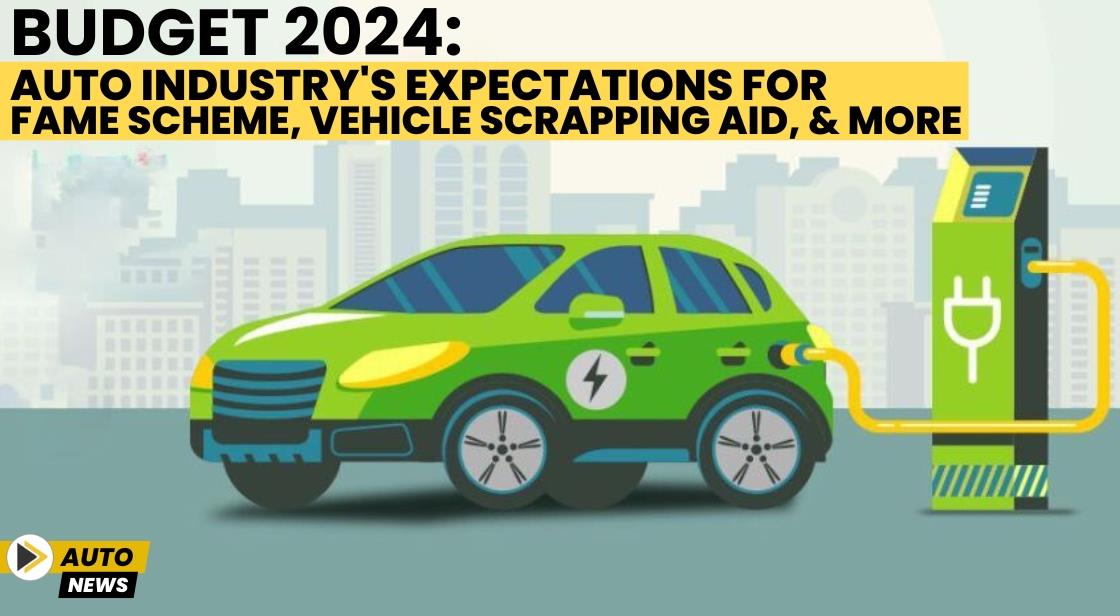Union Budget 2024: Auto Industry's Expectations for FAME Scheme, Vehicle Scrapping Aid, and More

News Synopsis
With the Union Budget set for presentation on July 23rd, 2024, by Finance Minister Nirmala Sitharaman, the Indian auto industry is abuzz with anticipation. This year's budget, marking the first of the Narendra Modi government's third term, holds immense significance for the sector's future trajectory. Let's delve into the key expectations the auto industry has from Budget 2024.
Union Budget 2024: A Decisive Moment for India's Auto Industry
Revving Up Electric Mobility: The FAME 3 Scheme in Focus
The Faster Adoption and Manufacturing of Hybrid and Electric Vehicles (FAME) scheme has played a pivotal role in fostering electric vehicle (EV) adoption in India. The FAME 2 scheme, with its subsidies, helped make EVs more affordable for consumers. However, the government's revision and subsequent conclusion of FAME 2 led to price hikes for EVs.
Industry stakeholders eagerly await the announcement of the much-anticipated FAME 3 scheme in Budget 2024. Expectations point towards a ₹10,000 crore outlay for FAME 3, aimed at:
-
Demand Boost Through Subsidies: The government is expected to incentivize EV purchases by subsidizing the upfront cost, making them more attractive to consumers.
-
Enhancing Domestic Manufacturing: The scheme is likely to prioritize promoting the local manufacturing of key EV components, fostering self-reliance and creating jobs within the Indian economy.
"In the upcoming budget, we advocate for initiatives and subsidy structures without segment caps which will in turn foster innovation and growth across multiple segments. Recent discussions surrounding the implementation of FAME 3 present a notable opportunity to enhance EV adoption in India," said Niraj Rajmohan, CTO and Co-Founder of Ultraviolette, highlighting the industry's desire for broader support within the EV landscape.
Beyond EVs: A Look at Other Industry Wishlists
While electric vehicles dominate the conversation around sustainable transportation, the auto industry holds other key expectations for Budget 2024:
Bringing Petrol and Diesel Under GST:
A longstanding industry demand is the inclusion of petrol and diesel under the ambit of the Goods and Services Tax (GST). This move could potentially lead to a reduction in fuel prices, providing much-needed relief to consumers burdened by high fuel costs.
Hybrid Incentives Take Center Stage:
Hybrid vehicles, often seen as a stepping stone towards full electrification, haven't received the same level of government support as EVs. Industry leaders, including Union Minister Nitin Gadkari, have called for a reduction in GST rates on hybrid vehicles. This could incentivize their adoption and offer consumers a broader range of eco-friendly choices. Companies like Maruti Suzuki, with a strong hybrid presence, stand to benefit from such a move.
Vehicle Scrapping Policy:
A Renewed Push: The Society of Indian Automobile Manufacturers (SIAM) and other industry bodies advocate for increased incentives under the existing vehicle scrapping policy. This policy targets older, polluting vehicles, encouraging their removal from the roads and promoting cleaner alternatives. A greater emphasis on scrapping incentives, particularly for commercial vehicles like trucks and buses, could significantly reduce emissions.
Expanding the Production Linked Incentive (PLI) Scheme:
Automakers are seeking an expansion of the government's PLI scheme, which offers production-based incentives. The industry desires an increase in incentives for both internal combustion engine (ICE) vehicles and EVs. Additionally, stakeholders propose extending the scheme to encompass a wider range of components, including tires, which have undergone significant technological advancements.
Conclusion: A Budget with the Power to Steer the Future
The upcoming budget holds the potential to significantly impact the Indian auto industry's trajectory. By addressing the key expectations outlined above, the government can pave the way for a more sustainable and self-reliant automotive sector. From fostering electric vehicle adoption to encouraging the scrapping of older vehicles, Budget 2024 has the power to shape the future of mobility in India.
You May Like









